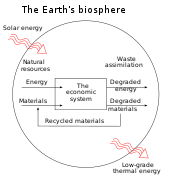| Part of a series on |
| Ecological economics |
|---|
 |
| Part of a series on |
| Marxism |
|---|
Metabolic rift is a theory of ecological crisis tendencies under the capitalist mode of production that sociologist John Bellamy Foster ascribes to Karl Marx. Quoting Marx, Foster defines this as the "irreparable rift in the interdependent process of social metabolism".[1]: 949 Foster argues that Marx theorized a rupture in the metabolic interaction between humanity and the rest of nature emanating from capitalist agricultural production and the growing division between town and country.
Foster, rather than Marx, coined the term “metabolic rift”. Foster argues the theory develops from Marx's earlier work in the Economic and Philosophical Manuscripts on species-being and the relationship between humans and nature. Metabolism is Marx's "mature analysis of the alienation of nature"[2]: ix and presents "a more solid—and scientific—way in which to depict the complex, dynamic interchange between human beings and nature, resulting from human labor."[3]
As opposed to those who have attributed to Marx a disregard for nature and responsibility for the environmental problems of the Soviet Union and other purportedly communist states, Foster sees in the theory of metabolic rift evidence of Marx's ecological perspective. The theory of metabolic rift "enable[ed] [Marx] to develop a critique of environmental degradation that anticipated much of present-day ecological thought",[2]: 142 including questions of sustainability as well as the limits of agricultural production using concentrated animal feeding operations.[4] Researchers building on the original Marxist concept have developed other similar terms like carbon rift.
- ^ Marx, Karl (1981). Capital, Vol. III. New York: Vintage Books.
- ^ a b Foster, John Bellamy (March 2000). Marx's Ecology: Materialism and Nature. New York: Monthly Review Press. ISBN 978-1-58367-012-5.
- ^ Foster, John Bellamy (September 1999). "Marx's Theory of Metabolic Rift: Classical Foundations for Environmental Sociology". American Journal of Sociology. 105 (2): 366–405. CiteSeerX 10.1.1.534.2551. doi:10.1086/210315. ISSN 0002-9602. JSTOR 10.1086/210315. S2CID 53608115.
- ^ Gunderson, Ryan (December 2011). "The Metabolic Rifts of Livestock Agribusiness". Organization & Environment. 24 (4): 404–422. doi:10.1177/1086026611424764. ISSN 1086-0266. S2CID 155076894.